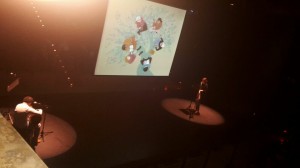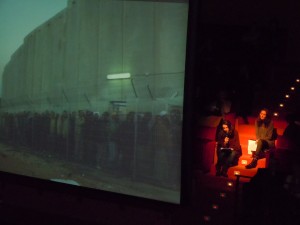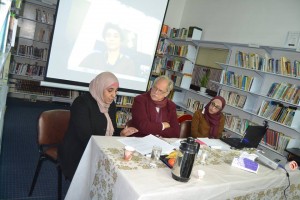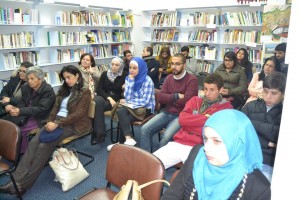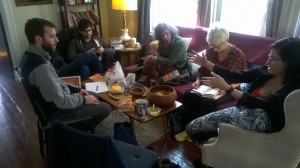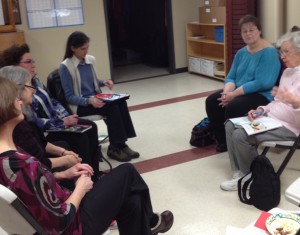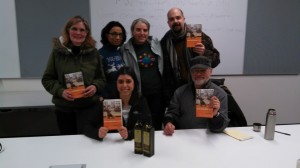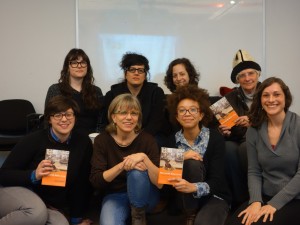2016: Sharon and My Mother-in-Law
In January 2016 (and beyond!) readers in cities and towns around the world came together to discuss Suad Amiry’s memoir Sharon and My Mother-in-Law and, in some cases, hear from author Amiry herself.
After a launch event with Amiry in Brooklyn, NY (video), reading groups in North America, Europe, and the Middle East attracted audiences ranging from intimate groups of fewer than 10 people to scores in some Italian cities.
In Sondrio, Italy, people came not only to talk about the book but also to experience an actor’s reading and music by a violinist. Following the performance, many people spoke about the moving quality of Suad’s writing, throwing you into the situation, while others pointed out the humorous side, explained the organizer. Some Palestinian solidarity activists in attendance shared their knowledge, and the topics went from BDS, land and water grabbing, home demolitions, the apartheid wall, the popular resistance, and the importance of promoting the abundant literary production coming out of Palestine.
Ramallah organizers brought together a panel of speakers including Amiry (via Skype). Dr. Roger Heacock discussed the importance of the book from a historical point of view, as well as the importance of oral history and the role of Adel Yahya, one of the most famous oral historians in Palestine. Arabic literature researcher Ala Qaraman then talked about the ability of Palestinians to write tragic/funny books about their daily suffering under the Israeli Occupation, and the importance of Suad’s book in Palestinian literature where we can find other writers (Ibrahim Tuqan, Mahmoud Darwish, Abed-Alkareem Alkarmy) who use a similar style in writing.
A discussion coordinator in Pittsburgh told LAP, “We all had a great time. What stood out for me was the parallels we were drawing between Palestinian experience in occupied territories and experiences of people of color in this country and specifically in our city and in prison. We also talked a lot about our privilege as American middle class white people. Another core topic was peoples’ ability to stay human and keep a sense of humor in the face of oppression and suffering.” A Detroit organizer said, “Discussion focused on institutionalized oppression and history of Palestine. Some participants drew connections to experiences of oppression in Detroit.”
In Bologna, participants first watched Suad Amiry’s 2011 talk at the TEDx conference in Ramallah and went on to have a lively conversation about Palestinian history, Israeli occupation, humor-style, Amiry’s life, the importance of culture in facing occupation, and more.
In Toronto, a participant with Palestinian family who hadn’t previously learned much about the region commented that this book was the perfect intro: it was informative, but also lightened by humor. The group as a whole shared reflections on what it means for the occupation to ‘ruin the spirit.’ This raised thoughtful insights into the interwoven nature of politics and spirituality. We also spoke of Amiry’s positionality and relative privilege, and how this might alter her experience living under occupation/curfew/etc.
* * *
January (and beyond) 2016! One Book, Many Communities: Sharon and My Mother-in-Law, by Suad Amiry.
- December 14, 2015. NYC launch event with New York-based LAP members and author Suad Amiry, Interference Archive. Brooklyn, NY, U.S. (video)
- January 13, 2016. Private group. Brooklyn, NY, U.S.
- January 20, 6-8pm. Detroit Public Library, Main Branch Room E, 1st Floor South Wing. Detroit, MI, U.S.
- January 23, 4pm. Resource Center at Tamer Institute. (flyer) Joint meeting with Tamer Institute for Community Education and IBBY Palestine, with guests Dr. Roger Heacock, Dr. Alaa’ Qaraman, and Suad Amiry via Skype. Ramallah, Palestine.
- January 23, 5pm. Centro Evangelico di Cultura in Malta Street n. 16. Sponsored by The Association Oltre il Mare-Beyond the Sea. Will feature an actress reading and a violinist. Sondrio, Italy.
- January 23, 6pm. Centro Culturale Candiani, Piazzale L. Candiani, 7 Mestre. Venice, Italy.
- January 24. 11:45am (after the 10:30am worship service). First Church, 110 North Pearl St. Albany, NY, U.S.
- January 24. Private group sponsored by Adalah-NY. New York, NY, U.S.
- January 26, 7pm. Madison Central Public Library. Sponsored by Madison-Rafah Sister City Project (MRSCP) and Peregrine Forum. For more information contact rafahsistercity (at) yahoo com or visit www.madisonrafah.org. Madison, WI, U.S.
- January 27, 5:30pm. Biblioteca Amilcar Cabral. Bologna, Italy.
- January 27, 6:30-8pm. The Book Tavern, 936 Broad St, Ste 101. Sponsored by CSRA Peace Alliance. Augusta, GA, U.S.
- January 29, 5-7pm. Antioch University Seattle, room 204. 2326 Sixth Ave. Sponsored by the Library and the Center for Teaching and Learning. Seattle, WA, U.S.
- January 30, 2pm. Plymouth UCC, 4010 Kalamazoo Ave S.E. Copies of the book will be available at Schuler Books and Music on 28th St on the Book Club table under “One Book, Many Communities.” To RSVP or for more info: 616.455.4260, plymouth (at) plymouthchurchgr org. Grand Rapids, MI, U.S.
- January 30, 5pm. Contact ulku.tekten (at) gmail com for details. New York, NY, U.S.
- January 30. New Orleans, LA, U.S.
- January 31, 1:30-3:30pm. RSVP to philly (at) jewishvoiceforpeace org for address. Sponsored by Jewish Voice for Peace – Philadelphia. Philadelphia, PA, U.S.
- January 31. Private group. Pittsburgh, PA, U.S.
- February 3, 6:30-8pm. Cloverdale Public Library. Cloverdale, CA, U.S.
- February 3, 7-9pm (doors open at 6:30). Beit Zatoun, 612 Markham St. Suggested donation $5-10 (pay what you can). Toronto, Ontario, Canada.
- February 22, 7:30pm. 98 Sderot Yerushalayim. Sponsored by All That’s Left. Jaffa, Israel.
- March 12, 2pm. Ella McClatchy Library, 2112 22nd St. Contact SacramentoBethlehem (at) yahoo com for details. Sacramento, CA, U.S.
- March 13, 7:30pm. English-speaking feminist book club. RSVP to ray DOT wofsy (at) gmail com for address. Paris, France.
Related Suad Amiry appearance
February 18, 6:30-8:30pm. “Palestine: Nothing Makes Sense Why Should I?: A Book Performance by Suad Amiry.” CUNY Graduate Center, The James Gallery, 365 Fifth Avenue, First Floor. (Facebook event page) New York, NY, U.S.
* * *
Customizable promotional materials for Sharon and My Mother-in-Law
Handout
* * *
2016 TOOLKIT
PLAN YOUR EVENT
Choose a venue. Remember that library, community center, bookstore and other public venue schedules can fill up fast, so schedule your event as soon as possible.
Pick a date in January 2016. Make sure you get it on the schedule of your venue. If January proves impossible and you need to schedule your group at a different time, that’s okay, too.
Choose a facilitator/leader for the discussion. Find someone who’s excited to read and help generate conversation around the book.
Plan the format. Depending on the size and nature of your event, this could be an informal conversation, a structured discussion around particular questions, a talk featuring a guest speaker, or even a group that meets on an online platform.
Tell LAP about your event. We will list and link to it on our own site and Facebook page.
Coordinate with your venue or host to ensure you understand logistics. What is the maximum number of people? Will there be refreshments? What is the seating (all participants should be able to see and hear one another)?
Get more ideas here:
- ALA: Book Discussion Groups + One Book, One Community resource page
- Beyond the Book (UK/Canadian site)
- Library of Congress: Center for the Book and LOC searchable directory of One Book programs
- One Book, One College: Common Reading Programs (Barbara Fister)
- Tips from the Seattle Public Library
PROMOTE YOUR EVENT
If your event is open to the public, publicize it:
- Use our resources for flyers and bookmarks, or make your own using the “One Book, Many Communities” logo. The templates include space for you to enter the date and location information for your event.
- Create a Facebook group and/or event page.
- Tweet and Instagram using the hashtag #lap1book. If you tag us (@Librarians2Pal), we will retweet!
Let participants know where they can obtain the book:
- Order from an independent bookseller (who has translated editions?).
- Bookstores serving as hosts may offer discounts as part of the deal, so please ask them!
HOLD YOUR EVENT
Document it. Take photos (with participants’ permission). Record any presentations. Live tweet the discussion! Remember to use the hashtag #lap1book.
Share tips for leading a great book discussion with your facilitator:
(several of these are adapted from the ALA Book Discussion Groups page)
- If possible, talk with co-participants in advance about your wishes and goals for the group. What would you and they like to get out of the experience? This could help you structure your meetings and build in time for refreshments, media viewing, etc.
- If you have time (and perhaps an online platform), consider collectively brainstorming questions about the book before the first meeting. This will give all participants a chance to help shape the discussion.
- Talk about your experiences of reading the book. Explore how the book made you feel, and the emotions, themes, and questions it brought up.
- Talk about any preconceptions you had before reading the book that changed after you read it, how did this book transform your attitudes and perceptions? What did you learn from it that you didn’t know before?
- Pick a passage that strikes you as interesting, moving, and/or thought-provoking. Read it aloud to the group. Discuss.
- Use secondary sources (including dictionaries, history texts, film, photography, see our resource guide [PDF] for ideas) to place the novel in new contexts. For instance, look up a historical event to learn more about it.
- If you could ask the author a question about the book, what would it be?
Ask one or more of these questions that LAP designed specifically about Sharon and My Mother-in-Law:
- Sharon and My Mother-in-Law began as a series of emails that Amiry wrote in English (not her native language) to friends outside of Palestine, which makes up the second half (Part Two) of this book. Part One was originally published as a separate book that had been written later. What does the text’s first intended audience mean for the book as it stands now? How does the book as a whole read to you?
- Suad Amiry deliberately uses humor as an instrument to explain and respond to Israeli oppression of Palestinians. In a talk at TEDx Ramallah, she says she’s made the decision that “writing humor and making fun of the situation is the best mechanism to go through life.” What do you think of this approach?
- During the airport incident that makes up the book’s first anecdote, Amiry reflects, “I have always believed that the occupation ruined the spirit of both Israelis and Palestinians.” In what ways is this true? What does a “ruined spirit” mean for Jewish Israelis versus for Palestinians?
- The book’s preface begins: “I don’t think I ever understood or, for that matter, forgave my parents, or the hundreds of thousands of Palestinians who fled their homes in 1948, until my husband and I had to flee our home in Ramallah on 18 November 2001.” How does displacement come up throughout the book?
- “Oh, how un-heroic Palestine and Palestinian lovers can be!” Amiry sighs as she signs an anti-PLO statement in order to re-enter the West Bank and reunite with Salim. Is “un-heroic” an appropriate way to characterize her action? What are the different ways we see people cope with being occupied? [Other examples: the International Women’s Day protest; the pots and pans demonstration; neighbors collaborating with Israeli officials; small individual rebellions such as Amiry’s staring at the Israeli soldier.]
- As a middle-class professional woman in Ramallah, how does Amiry resist the Israeli occupation in ways that Palestinians not of her class, ability, or gender may not be able to?
- “To be able to move about freely and stay out late at night was what we enjoyed most. We realized we had totally forgotten what normal life is all about,” Amiry writes after a relaxing trip (involving much logistical planning and juggling of travel documents) to Egypt. What other aspects of “normal life” are people we meet in the book missing out on?
- Amiry describes being interviewed on the prominent U.S. news program “60 Minutes” and fantasizes about a conversation with President George Bush (the first). Discuss how American politics and the perception of Palestinians in the U.S. are relevant to the Israeli occupation and other events in the book.
- [For discussions among people already involved in Palestine solidarity work.] How can this book be used to spread awareness of the issues that Palestinians face? How is Amiry’s approach effective? What are its limitations?
Distribute any additional resources to discussion participants. You can use our resource guide (PDF) for Sharon and My Mother-in-Law for additional information and suggested further readings.
Encourage participants to keep the conversation going. Suggest that people donate their no-longer-needed copies of Sharon and My Mother-in-Law to a local public, university, or school library or other community center (but check first to make sure they take book donations!).
